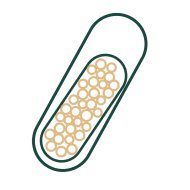
Do you have questions?
Need additional advice? No problem! Ask our team of experts. We'd love to hear from you.

Our liver, an essential organ for our overall health, deserves more attention than we usually give it. Although alcohol is often seen as the culprit for liver-related health problems, there is another silent assassin: non-alcoholic fatty liver disease (NAFLD), or fatty liver disease without alcohol being the main cause. Thus, this condition can also affect people who drink little to no alcohol but still suffer the negative effects of a buildup of fat in the liver. A major factor here is fructose, a sugar commonly used in processed foods that can lead to excessive fat accumulation in liver cells. In addition, the intake of medication, pollution, as well as stress ... are partly the cause of a stressed liver.
Too much fructose can cause a negative impact on your blood sugar levels. It can be at the root of all kinds of ailments such as weight gain, hormonal imbalance, fatigue, ... A balanced blood sugar level is crucial for an optimal metabolism.
To maintain this balance, it is advisable to choose a healthy diet, focusing on lots of vegetables, sufficient proteins and healthy fats. In addition, regular exercise and maintaining a healthy weight can also help stabilize your blood sugar levels.The liver plays a vital role in maintaining healthy blood sugar levels. It regulates the amount of glucose (sugar) in the bloodstream by storing excess glucose as glycogen and releasing it when needed. Additionally, the liver is responsible for converting certain nutrients into glucose through a process called gluconeogenesis. Therefore, it is very important to keep the liver as pure as possible. This avoids common complaints such as energy loss, hormonal imbalance, weight fluctuations and skin blemishes.
"A fatty liver is the disease of the future"

Detoxifying the liver is an essential aspect of preventive health care, as it can often address the "cause" of ailments. In the body, this process occurs in 3 phases:
Here the oxygen group is bound to the waste products. This process requires the active involvement of CYP450 enzymes. These are also responsible for addressing the free radicals generated during this phase.
In this phase, wastes are made soluble, allowing them to be easily excreted through the bile, intestines and urine.
The third and final phase is the detoxification of free radicals. During this phase, antioxidants provide much-needed protection against the harmful effects of free radicals.
Phase 2 & 3 are best tackled with the antioxidant glutathione for effective results. It plays a central role in protecting the liver and maintaining its good health.
Fill your plate 50% with vegetables. Don't eat until you are satisfied. Adding vegetables at the beginning of each meal is an easy tip to apply. Vegetables offer fiber, vitamins and minerals that are essential for a balanced diet.
Limit the consumption of processed and red meat. Instead, choose lean meat, poultry, fish or plant-based protein sources.
Although fruit is healthy, it contains natural sugars. Limit your fruit consumption to no more than 2-3 pieces per day to balance your overall sugar intake. Eat up to 4 soft boiled eggs per week Eggs are a nutritious source of protein, opt for liquid egg yolks. This contains more choline, a boost for your liver. Use vegetable fats in moderation Choose healthy vegetable fats, such as olive oil or avocado oil, but keep an eye on portions. Limit consumption to no more than 2 tablespoons per meal to maintain a healthy balance.
Although dairy products are important sources of calcium, it is best to limit their intake and opt for low-fat options. Also consider alternatives such as almond or coconut milk. Choose plant-based days from time to time. Vary your diet by choosing occasional days when you consume all-vegetable meals. This promotes a diversity of nutrients and is beneficial to both your health, your gut microbiome and the environment.
Hydration is essential for good health. Make sure you drink enough water daily. A general guideline is about 8 glasses of water per day, but individual needs may vary. Listen to your body and adjust your water intake accordingly. It's best to drink water in bulk, so big sips and not small sips throughout the day.

You might think that a fatty liver always results in sugar spikes, but that is not entirely true. With a loaded liver, we actually see two major problems: no spikes and continuous spikes. A body response in the form of a spike after eating a meal is normal. But throughout the day, we try to stabilize the number of spikes as much as possible through healthy eating and proper food combinations. An important, but often overlooked parameter, is time in the risk zone. Constant spikes caused by a stressed liver increase this time in the risk zone. This is precisely something we want to reduce in healthy people. Correct diagnosis is therefore essential. Just looking at the fluctuations without linking them to the health of your liver can affect your metabolism. A fatty liver is more likely to show hypoglycemic reactions at night. So it's not just about the sugar spikes, but also the variability and time in the risk zone.
Translated with www.DeepL.com/Translator (free version)
"So it's not just about the sugar spikes, it's also about the variability and time in the risk zone."

At Insentials, we look at the root cause of the problem. We understand that it's not just about treating symptoms, but addressing the root causes for a truly sustainable solution.
Want to learn more about how we can help improve your liver health and stabilize your blood sugar levels? Then contact us for a personalized consultation. Your health is our priority.